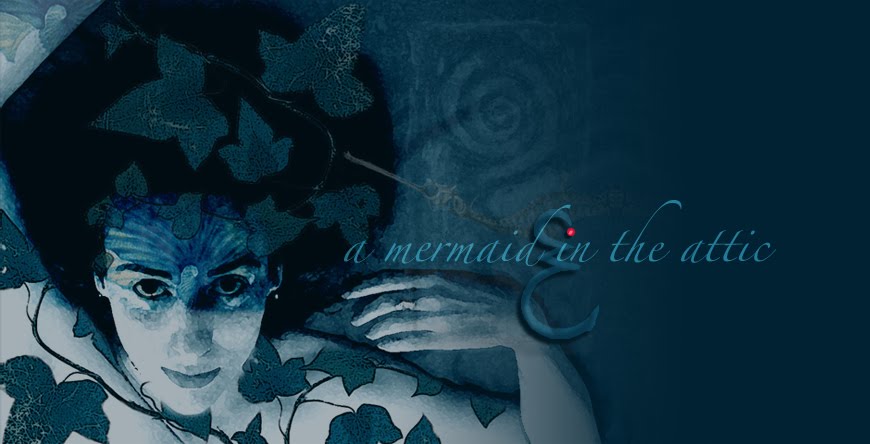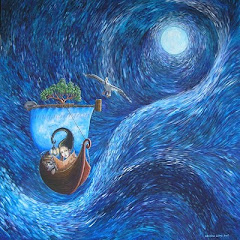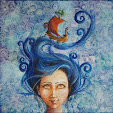one of the primary functions of the shaman is to mediate between the mortal world and the Otherworld. Jones comments that "The Otherworld can perhaps be regarded as a psychological state related through language", making a poet a natural choice for shaman. This psychological state is another state of consciousness that alters the perception of reality. In normal life, we live in consensus reality, the purpose of which is "to provide a structure for filtering masses of potentially perceptible raw data into a manageable flow that offers enough information about the environment to enable us to function, but not so much information as to be overwhelming." A shaman is able to leave consensus reality and enter another state; "an altered state is merely a different filtering of the same mass of available data."Now this makes sense! The idea of a 'consensus reality', essentially a version of reality that we all agree to adhere to (without really having much choice I suppose, society teaches us and we believe), in order for society to run smoothly. But one that you can step out of, because it's really just one way of thinking out of infinite possibilities. I'm not a psychologist, but I imagine it as some kind of highway we're all on, we're all travelling in the same direction, going approximately the same speed, seeing the same landmarks from the same point of view. But you can get off it. You can take a side exit, head down a disused track, step away and look at the highway streaming past from outside of it. See those landmarks from a new vista. Take the scenic route, so to speak. Which might explain why it always seems to take me so much longer to do the normal, ordinary, everyday stuff (like housework!), because I'm on the slow road to somewhere else in my head! The ideal situation would be that you can choose opportune moments to 'sidetrack' and then pop back into line and catch up with everyone else. I suspect the problem is that sometimes you don't really choose. The sidetrack appears and before you know it you're off on an adventure somewhere, and then sometimes it takes a real effort to find your way back onto the highway, at least in time to get dinner on, or pick the kids up from school. Maybe that's the sliding scale between creativity and so-called 'madness'. Healthy creative people can pick their moments and find their way back easily. People suffering from mental health problems may not realise they've gone off on the track at all, or may find themselves hopelessly lost. I've probably taken that metaphor as far as it can go, but it made me think. Especially after reading about 'Translogical Thinking' yesterday. It seems to fit nicely with that concept.
Today I went back to a book that I read a couple years ago, The Brain that Changes Itself by Dr. Norman Doidge. Fascinating stuff, it discusses new discoveries in Neuro research that overturn older ideas that the adult brain was hardwired and incapable of change. Instead, it talks about 'neuroplasticity', the flexible, malleable, changeable brain, that is capable of re-wiring itself, and more interestingly for this discussion, mentions some pretty weird and bizarre things that have been discovered. That is is quite easy, for example, with the help of simple illusions, to trick a healthy person's brain into believing that a wooden table is part of their anatomy, even when that person is well aware that it cannot be. That 'normal' people who are denied sight even for just a few days, can develop extremely acute hearing and tactile senses as the 'visual cortices' that aren't being used for sight take over some of those tasks, thus increasing the amount of 'brain power' (so to speak) that is given over to handling aural and tactile input. And that many started to experience very vivid, strange hallucinations as they moved around, heard sounds, or were touched. The fact that autistic people can often hear things that 'normal' people cannot, and find sounds that don't bother us utterly deafening, suggests (to me at least), that 'normal' people might not be getting the full dose of reality at all, but rather a filtered version. Filtered through a brain that is shaped and altered by the experiences it has, and importantly, by the culture it develops in. So while our brains may shape our culture, our culture also shapes our brains, and therefore must shape our perception of reality. It seems to me that definitions of what is 'reality' and what is a 'normal' brain all start to look very...fuzzy.
What I also noticed in the book, was the number of times phrases like, "Dr Such-and-such was the first to see the link between...", "Professor Thingummy made the connection...", "Dr Whatsit saw the affect this had and wondered if it could be applied to..." Which all sound to me like different ways of describing 'Translogical Thinking.' And they're phrases we're very familiar with when it comes to speaking about scientific breakthroughs, new discoveries, exciting medical research and so on. So while maybe creative people's brains have similarities to people suffering from various mental illnesses, it's pretty clear that these abilities are vital to the development of humanity and civilisation. I guess, as in the case of so many other things, it comes down to a balancing act. Too far one way and mental illness and psychosis might be the result. But too far the other and we might still be living in trees.
So...where does that leave inspiration and the muse? Perhaps the muse is just the whisper of synapses firing in unusual combinations in the brain. Perhaps the muse actually exists as a real, physical entity who keeps you awake at night with shreds of ideas and characters and paintings that need to be created, an entity that 'normal' brains can't see/hear/feel because it's their brains that don't work properly, or at least, don't show them the whole of reality because they couldn't handle it...oh I'm just being cheeky now, as I've managed to include myself in both camps throughout the course of this argument!
Or maybe it's both...or neither...or something else entirely that we can't even begin to comprehend. In any case, though perhaps I pay a price in more ups and downs, more dark fallow times, more times of doubt and fear that my talent amounts to nothing, than the 'average person' (if indeed they exist), I would not trade my delight in indulging in 'translogical thinking', in getting off the highway into the interesting sidetracks, and in listening to the whispers of the muse, for what might be an easier, and more....normal?!...way of thinking.




